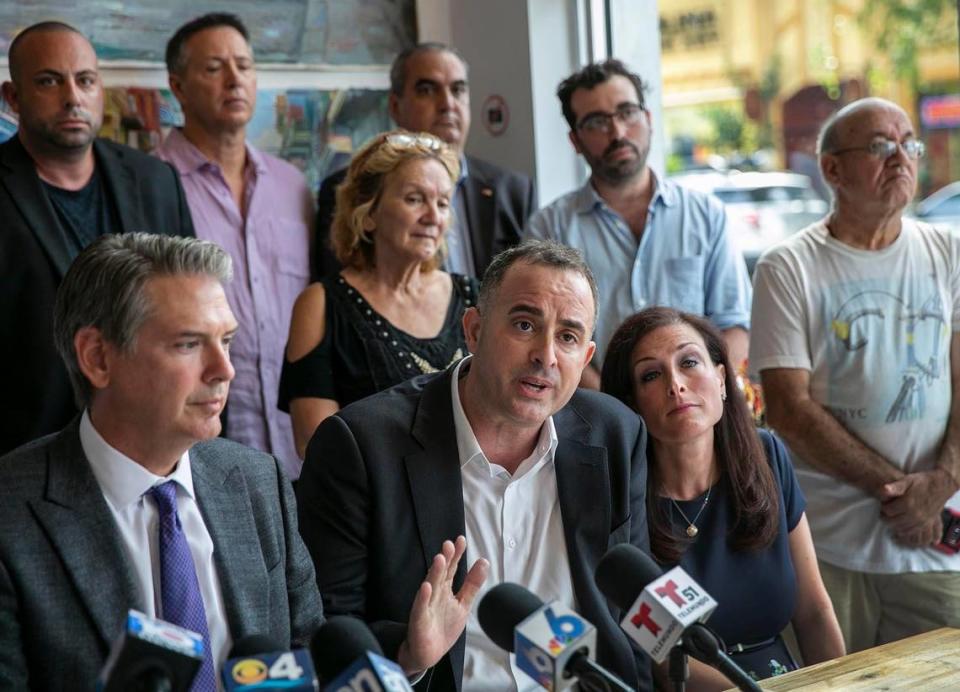‘They are all lying.’ Days as witness show why Joe Carollo is Miami’s most mercurial politico
After three days of testimony this week in federal court, Miami Commissioner Joe Carollo has branded almost a dozen witnesses against him as liars, including the attorney asking him questions.
He accused one businessman suing him of election fraud. He said he’s convinced wealthy Venezuelans want to buy up Little Havana. And he began to tell a story of meeting a Cuban Jew who told him of Iranians infiltrating a mosque in Cuba with nefarious aims somewhere in Latin America before the judge cut him off.
His marathon turn as a star witness has simply been Joe being Joe: outspoken, brusque, combative, meandering, conspiracy-driven — one of the longest-running characters in the soap opera of Miami politics. Carollo has spent hours on the stand defending himself in a lawsuit filed by two Little Havana businessmen who claim he used city resources to stifle their First Amendment rights and pressured code enforcement to try and destroy their business interests.
To those who know Joe Carollo, it’s gone almost exactly as expected — the days on the stand distilling a career marked by controversy and clashes. But the reaction of another group is more important, and uncertain: What will a group of jurors from Broward County, who trek to Miami for each civil trial session, make of his mercurial performance?
“He demands 100 percent loyalty. And if you go down to 99 percent, you become his enemy. And when he takes on an issue, he doesn’t let go,” said former Miami Mayor Tomas Regalado. Regalado began following Carollo’s career as a radio journalist in the 1970s. The two were politically friendly in Miami until the late 1990s when they took opposing sides over the employment of city manager Jose Garcia-Pedrosa — who Carollo, as mayor, fired three times.
In fairness, Carollo, 68, is a walking contradiction now in his sixth decade of public service. He tends to wear on his staffers, bullies political opponents, leaves enemies at almost every stop and — as the trial underlines — tries to run the city government like he owns it. But he’s also uncovered wrongdoing and corruption and, love or hate him, keeps getting re-elected. A few key events and clashes from his past:
▪ In 1979 at the age of 24, Carollo was at the time the youngest to ever win a Miami commission seat. Within three years Police Chief Kenneth Harms had accused him of doing political favors for a rich Sheikh. Nothing came of it.
▪ In 1983 as cameras rolled in expectation of his endorsement for Maurice Ferre as mayor, Carollo instead said Ferre’s campaign was anti-Cuban and refused to support him. Yet 34 years later in 2017, before winning his most recent commission seat, Ferre’s endorsement of Carollo contributed to his victory in an extremely light turnout election. Somehow, fences were mended.
▪ In 1997, after apparently losing Miami’s mayoral race to Xavier Suarez, Carollo helped uncover voter fraud that led to more than two dozen arrests and Suarez being tossed from office. Carollo became mayor when an appeals court ruled in his favor. The following year Carollo would be arrested on a domestic battery charge for throwing a cardboard teabox that grazed his wife in their Coconut Grove home. He was jailed for a night. The charge was later dropped.
▪ Then in April 2000, Carollo fired City Manager Donald Warshaw five days after young rafter Elian Gonzalez was hauled away by federal agents. A few days later as a guest on Sean Hannity’s program Carollo insinuated that Warshaw plotted with the U.S. Department of Justice to seize Elian in order to score some “IOU’s.” By September of that same year, Warshaw was indicted by the feds for misusing police and charity funds to buy himself hockey season tickets and other luxury items — issues Carollo said he was aware of the whole time, but couldn’t share publicly.
▪ Several witnesses during the trial have testified that Carollo took issue with a large mural in Little Havana depicting a group of Afro-Cubans, which he vehemently denied on the stand. But it’s not the first time the commissioner has had to defend himself against allegations of racism. He once referred to Miami’s first Black manager as an “Oreo cookie” and compared a fellow Black commissioner to Ugandan strongman Idi Amin. And way back before he started his political career, he left a job as a public service officer at Miami-Dade police in the 1970s after sticking a cartoon about the Ku Klux Klan in mailboxes of several officers. Carollo has long insisted the prank was misunderstood and that the cartoon out of Mad magazine actually made fun of the group.
A fight for reputation and power
Now, seemingly nearing the end of a political career spanning six decades, Carollo is fighting to save his reputation and power. But he also may be fighting to remain financially solvent.
The commissioner is being sued personally by two Little Havana businessmen who say Carollo “weaponized” city resources to try and destroy their businesses. William Fuller and Martin Pinilla, who operate a string of businesses along the Little Havana business corridor that include the iconic Ball & Chain nightclub, are seeking $2.5 million and possible punitive damages.

Their lawsuit argues that Carollo began his campaign against them after they announced support for attorney Alfonso “Alfie” Leon, who Carollo defeated in a runoff for Miami’s Little Havana commission seat in 2017. The men say Carollo pressured code enforcement officers to visit at least two of their venues 84 times and that Carollo wanted their liquor licenses stripped. One business closed. Another moved away from the area.
The feud escalated. In early May 2018, Fuller invited the media to the footsteps of Coconut Grove City Hall and as a commission meeting was taking place behind him, demanded the city open an investigation into code violations at Carollo’s own Coconut Grove home. Two weeks later the city found several violations at the home for work being done without a permit. Among the issues: A carport and paving that lacked proper permits. They filed the lawsuit against Carollo a few months later.
The trial, in the midst of its fourth week, has been beset by twists and turns — from a change of venue after an historical flood forced a move from federal court in Fort Lauderdale, to allegations of spying and juror intimidation. The judge has already denied motions for mistrials from Carollo’s defense team.
For Carollo, some of the bridges he’s burned could come back to haunt him. So far testifying against Carollo: a city manager he forced out, three former police chiefs he clashed with, and three of his former staffers. Included among them is Richie Blom, his former handpicked police chief in Doral who would later become his chief of staff in Miami.
“Being his friend is very difficult because he will eventually find something to make you his enemy,” said Regalado, who plans on running for mayor again in 2025. “Maybe even something that doesn’t even exist.”
Two of the chiefs, the city manager and former staffers echoed each other, testifying that Carollo “targeted” businesses run by Fuller and Pinilla as a political vendetta. Blom testified that Carollo wanted him to spy on Fuller. He said he was asked to sneak up to a business and tape measure its distance to a neighboring religious facility, with the aim of having its liquor license revoked.
But the star witness has been Carollo himself, who swore an oath to tell the truth before U.S. District Judge Rodney Smith in room 13-4 at the Wilkie D. Ferguson Federal Courthouse in downtown Miami at 9:40 a.m. Monday morning. He was still testifying when court broke at noon Wednesday and is expected back on the stand early Friday morning.

The sparks between Carollo and plaintiff lawyer Jeff Gutchess flew as soon as Carollo lowered his right hand and the attorney informed him that lying under oath was a crime. He asked Carollo if former staffers who testified under oath had told the truth. Of particular concern to Carollo was the testimony of former receptionist Tanjha Quintana, who told jurors she was ordered by Carollo to say that Blom and commission liaison Steve Miro sexually harassed her while they were on the outs with the commissioner. She admitted she lied in an earlier deposition.
“That’s absolutely not true. It’s ridiculous,” said Carollo.
At one point during questioning, Gutchess showed a mural in Little Havana depicting Afro-Cubans. Some had testified the commissioner believed the painting was “scary.” Carollo took exception and went off script.
“This is very well orchestrated by you people. I have no problem with this mural,” he told Gutchess. “For you guys to have done this and to think it’s so cute to try and bias this jury, it’s sickening. In fact I’d put my record against anyone in the city.”
When Gutchess asked Carollo if the three witnesses who testified that the commissioner had an issue with the mural were lying, Carollo responded, “I’m saying they are all lying.” Then Carollo went on a rant about how he didn’t want Little Havana to become like Wynwood, which has murals of “scary people with big heads and gook coming out of their nostrils.”
The back-and-forth with Gutchess continued through Tuesday, with Judge Smith repeatedly stopping Carollo from going off on tangents but also agreeing with objections from Carollo’s defense team that Gutchess was often offering opinions instead of asking questions.
The ‘Godfather” theme regret
Gutchess finished his questioning by playing a video taken in a small conference room behind the dais of the Miami commission chamber in October of 2021, moments after Carollo had engineered the vote to oust former police chief and Carollo foe, Art Acevedo. As heir apparent Manny Morales looked on seemingly uncomfortable, Carollo played the theme from the Godfather movies on his cellphone.
“I’ll admit, I probably shouldn’t have done that. We did it as a joke,” said Carollo. “Do I wish I could take it back. I certainly do.”
Finally, late Tuesday afternoon and early Wednesday Carollo’s attorney Ben Kuehne had his chance to sway jurors and soften Carollo’s image. He explained how Carollo came into office with promises of improving quality of life and public safety issues in and around the Little Havana area. The commissioner told of children he found living in squalor in a building and who had been bitten by rats and how he helped them.
Carollo has repeatedly denied ever targeting Fuller’s properties and claimed he met the businessman just once before he was elected. Fuller, he said, told him that he was having trouble with the permitting process in Miami and that if Carollo was willing to help him out, he’d support his run for commissioner. Carollo said he did not act on that offer, which he said raised a “red flag.”
In Carollo’s view, it’s the lawsuit against him that is the real political retaliation — and he’s the victim.
“Frankly, I didn’t know the power this man had until I was elected,” Carollo told jurors.
